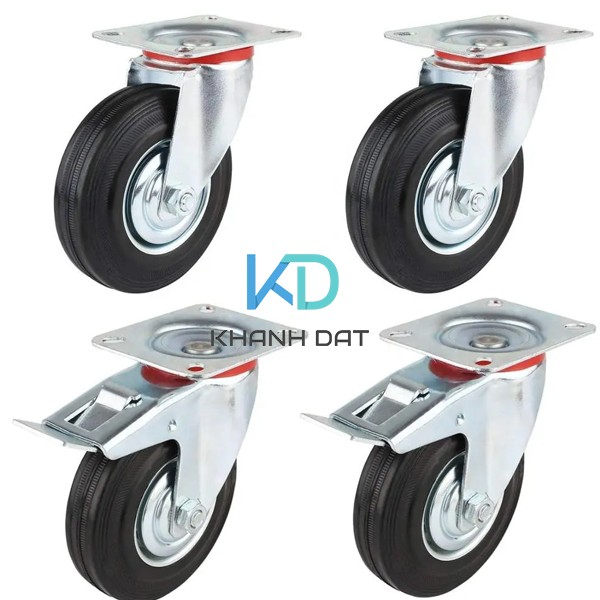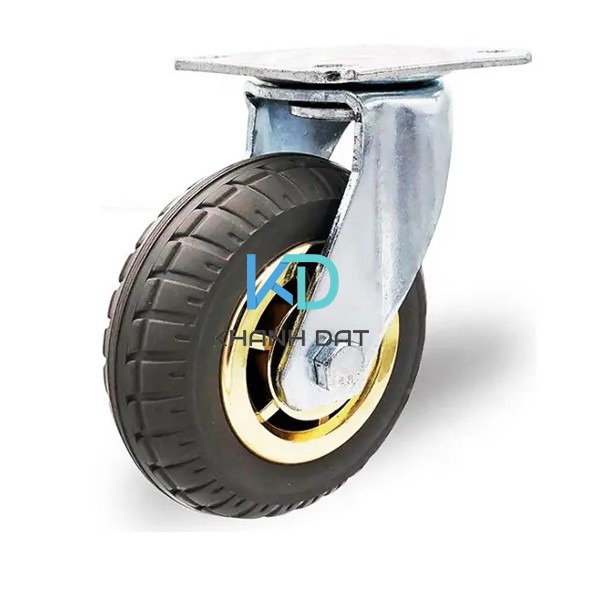Heavy-duty rubber wheels are the ideal solution for moving heavy goods in industries, warehouses, factories, and many other applications. With superior load capacity, high durability, and smooth operation, these wheels are becoming increasingly popular. This article will provide detailed information about heavy-duty rubber wheels, from their construction and advantages to the factors affecting their price and practical applications.
 Solid rubber wheel for heavy loads
Solid rubber wheel for heavy loads
Popular Types of Heavy-Duty Rubber Wheels
Currently, the market offers many types of heavy-duty rubber wheels with different sizes, load capacities, and designs to meet the diverse needs of users. Some popular types include:
- Solid Rubber Wheels: This type of wheel is made from solid rubber without an inner tube. The advantages of solid rubber wheels are high durability, good load capacity, puncture resistance, and low maintenance. The disadvantage is that movement can be noisy and less resilient than pneumatic wheels. They are often used in heavy industrial environments where the terrain is rough and high load capacity is required.
- Pneumatic Rubber Wheels: Pneumatic rubber wheels have an inner tube, which helps to move more smoothly and reduces vibration for goods. However, this type of wheel is prone to punctures and needs to be maintained regularly. Suitable for moving on smooth surfaces, requiring minimal noise and vibration.
- Cast Rubber Wheels: Manufactured by pouring molten rubber into a mold, creating a monolithic wheel with high strength and hardness. Suitable for harsh working environments, requiring extremely high load capacity.
Factors Affecting the Price of Heavy-Duty Rubber Wheels
The price of heavy-duty rubber wheels depends on many factors, including:
- Size: The larger the wheel diameter and width, the higher the price.
- Load Capacity: The greater the load capacity, the higher the wheel price.
- Material: The type of rubber used, the material of the wheel rim (steel, nylon, etc.) affects the price.
- Brand: Well-known brands are often more expensive due to quality and reputation.
- Transportation Distance: Transportation costs also affect the final selling price.
 Close-up of a solid rubber wheel designed for high weight support
Close-up of a solid rubber wheel designed for high weight support
Advantages of Heavy-Duty Rubber Wheels
- High Durability: Resistant to impacts, abrasion, and strong environmental impacts.
- Large Load Capacity: Can transport heavy goods safely.
- Smooth Operation: Reduces noise and vibration, protecting goods.
- Good Grip: Safe to move on many types of terrain.
- Weather Resistance: Less affected by temperature, humidity, chemicals.
- Long Lifespan: Reduces maintenance and replacement costs.
Applications of Heavy-Duty Rubber Wheels
Heavy-duty rubber wheels are widely used in:
- Hand Trucks: In warehouses, supermarkets, factories.
- Forklifts: Transporting pallets and heavy goods.
- Industrial Machinery: Supporting the movement of machinery and equipment.
- Agriculture: Used in tractors and agricultural machinery.
- Construction: Applied in wheelbarrows and scaffolding.
Conclusion
Heavy-duty rubber wheels are an important component in many industrial and civil applications. Choosing the right type of wheel for your needs will help optimize work efficiency and save costs. Contact Xe Tải Mỹ Đình for advice and to choose the best quality heavy-duty rubber wheel products. We offer a variety of wheels with different sizes and load capacities, meeting all your needs.
